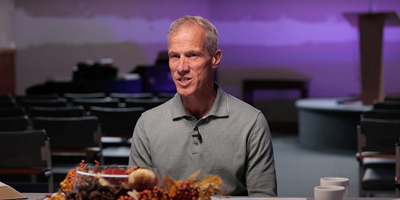Many of us who are UK residents have lived in relative comfort for decades and, until recently, had never experienced a pandemic or a war. However, history teaches us that this world has always had pandemics and wars.
Just as we seem to be leaving the worst of the COVID pandemic, a war has erupted in eastern Europe that may yet spread across our continent and will certainly have ramifications for years to come. For those under 75 years of age, war seems closer than it has ever been.
How should the believer react? How should we think?
An evil and wicked ruler invading another nation is not a new occurrence. Some 2,600 years ago the prophet Habakkuk was told that a cruel and fearsome army would invade his country. A brief overview of his book will teach us lessons that God wants His people to learn.
In the opening verses of his short book, Habakkuk records his cry to God concerning the ungodliness of the people:
“O LORD, how long shall I cry, and You will not hear? Even cry out to You, "Violence!" and You will not save” (Habakkuk 1:2).
It is undoubtedly an anguished cry from a man who has seen all manner of sin. It is the kind of cry any believer might utter as they witness the ungodliness of the people around them.
The great surprise and shock for Habakkuk comes in the Lord’s response:
“For indeed I am raising up the Chaldeans [Babylonians], a bitter and hasty nation which marches through the breadth of the earth, to possess dwelling places that are not theirs” (Habakkuk 1:6).
God is not going to send revival, but He is raising up the ungodly and thoroughly evil Babylonians to invade the land. They will take captives and destroy property.
This is not the answer that Habakkuk expected or desired. He speaks to the Lord a second time:
“You are of purer eyes than to behold evil, and cannot look on wickedness. Why do You look on those who deal treacherously, and hold Your tongue when the wicked devours a person more righteous than he?” (Habakkuk 1:13).
The prophet questions how God, who cannot tolerate wickedness, will use the Babylonians as agents of judgement. He then waits for the Lord’s answer.
In Habakkuk chapter 2 we can read the Lord’s response to Habakkuk’s prayer. Yes, the Babylonians will be judged for their wickedness, but the key for God’s people then, as it is for us now, is found in verse 4b:
“But the just shall live by his faith.”
In bewildering and dark times, the call of God is to trust Him. When the situation seems hopeless and desperate, the people of God are to keep faith in Him.
Shortly after WW2 Martin Lloyd-Jones preached from the book of Habakkuk to a nation that was still in shock from the horrors of those dark times. He made four points that are true today. They need to be remembered and retold by every believer.
- History is under God’s control. God is Lord of history. He is seated in the heavens, and the nations to him are “as a drop in a bucket . . . as the small dust on the scales . . . like grasshoppers” (Isaiah 40:15,22).
- History follows a divine plan. The events of history are not accidental, though they may appear so to us. They follow God’s plan.
- History follows a divine timetable. When God says, “I am going to do something in your days”, that means it will take place not before or after but precisely according to His plan.
- History is bound up with the divine kingdom. We need not become bewildered, and doubt the love or the justice of God. His purpose for His people will not, indeed cannot, fail.
Interestingly the key verse, “But the just shall live by his faith”, is only three words in the original Hebrew and is quoted three times in the New Testament (Romans 1:17, Galatians 3:11 and Hebrews 10:38).
The three words could be roughly translated thus, “Just live faith”.
In Romans, we learn how a man can be just, or righteous, in God’s sight. Paul says he is not ashamed of the gospel,
“For in it the righteousness of God is revealed from faith to faith; as it is written, ‘the just shall live by faith” (Romans 1:17).
In Hebrews, we learn what faith is. Chapter 11 has the great record of those who have lived by faith. They stand as witnesses to us, encouraging us to continue in faith and not shrink back:
“Now the just shall live by faith; but if anyone draws back, my soul has no pleasure in him” (Hebrews 10:38).
In Galatians, we learn the only way to live is “by faith”. Faith is not just the entry point for the Christian life, but it is the rich vein that must run through every believer’s life. All that we know, and love may disappear. But the righteous can live by faith in the One who keeps them, not only in the moment of their coming to faith in Jesus Christ as Lord and Saviour, but in every later moment of life as well.
As we look at the world around, we will be fearful and anxious. If we look to the Lord we can have peace and confidence. May every believer be able, by God’s grace, to do that.
Photo credit: Kharkiv downtown street destroyed by Russian bombardment (mvs.gov.ua)






























